Controversial BJP MP Ramesh Bidhuri Assigned Election Duty in Rajasthan’s Tonk, Sparking Outrage

Controversial BJP MP Ramesh Bidhuri Assigned Election Duty in Rajasthan’s Tonk, Sparking Outrage
In a move that has raised eyebrows and sparked controversy, Bharatiya Janata Party (BJP) Member of Parliament Ramesh Bidhuri, who was recently issued a showcause notice by his own party for verbally abusing Bahujan Samaj Party (BSP) MP Danish Ali in the Lok Sabha, has been assigned election duty in Rajasthan’s Tonk district. The decision has drawn sharp criticism from opposition leaders, including Mahua Moitra of the Trinamool Congress (TMC), who have accused the BJP of rewarding Bidhuri for his inflammatory remarks.
The decision to appoint Bidhuri to election duty comes on the heels of a contentious incident in the Lok Sabha, where he directed derogatory language at Danish Ali, a fellow parliamentarian. Bidhuri’s use of offensive terms like ‘Bhadwa’ and ‘Katwa’ to refer to the BSP MP triggered outrage and led to his party issuing a showcause notice. This notice was seen as an internal disciplinary measure intended to address Bidhuri’s behavior.
However, the recent announcement that Bidhuri would be entrusted with election duties in Tonk, Rajasthan, has raised questions about the BJP’s commitment to upholding decorum and the standards of conduct expected from its members. Mahua Moitra, known for her outspokenness, wasted no time in expressing her concerns. She took to social media to voice her disapproval, stating, “Knew it! Ramesh Bidhuri rewarded for calling Muslim MP ‘Bhadwa’ & ‘Katwa’ in Lok Sabha. How does a showcaused person be given a new role.”
The timing of this decision has also been questioned, as it coincides with the upcoming elections in Rajasthan. Tonk, with its diverse demographic, is a crucial battleground in the state’s political landscape. Many argue that appointing a member with a recent history of using inflammatory language may not contribute positively to the electoral process.

The controversy surrounding Bidhuri’s new role highlights broader concerns about the standards of conduct expected from elected representatives and the consequences, or lack thereof, for those who violate these norms. The use of derogatory language in parliamentary proceedings has been a recurring issue, with calls for stricter measures to ensure civility and respect among lawmakers.
The decision to entrust election duty to Bidhuri also raises questions about the BJP’s commitment to inclusive politics, as the comments in question were directed at a Muslim MP. Critics argue that this move could further polarize the political landscape and undermine the principles of secularism and tolerance.
In response to the growing criticism, the BJP has defended its decision, emphasizing that election duty assignments are made based on a variety of factors, including administrative considerations and the availability of MPs. However, the optics of appointing a member who recently faced disciplinary action for using offensive language have not escaped the attention of the public.
As the controversy surrounding Ramesh Bidhuri’s new role continues to simmer, it serves as a reminder of the challenges faced in maintaining decorum and respectful discourse within the realm of Indian politics. It also underscores the need for greater accountability and transparency in the process of assigning election duties to members of parliament, especially in sensitive constituencies like Tonk, where social harmony and inclusivity are of paramount importance.
The contentious decision to assign Ramesh Bidhuri to election duty in Tonk has had a ripple effect beyond the political realm. Civil society organizations, activists, and concerned citizens have weighed in on the matter, with many demanding a reconsideration of the appointment. They argue that the use of derogatory language by elected officials not only erodes the sanctity of parliamentary proceedings but also sets a worrying precedent for future conduct. The incident involving Bidhuri has reignited debates about the need for a code of ethics for lawmakers to ensure that the dignity of the parliamentary institution is upheld.

The episode has also prompted a broader discussion on the role of social media in shaping public opinion and holding elected representatives accountable. Mahua Moitra’s swift response on social media platforms played a crucial role in bringing this issue to the forefront of public discourse. In an era where information travels rapidly and public sentiment can be galvanized within minutes, social media has become a potent tool for political communication and activism.
Furthermore, this controversy has exposed the challenges faced by political parties in balancing disciplinary actions with political exigencies. Parties often find themselves in a delicate dance, trying to maintain internal discipline while also considering the political implications of their decisions. The BJP’s handling of this situation will likely be closely scrutinized as it navigates the delicate balance between party loyalty and public perception.

In conclusion, the decision to assign Ramesh Bidhuri to election duty in Rajasthan’s Tonk district has ignited a firestorm of controversy that raises fundamental questions about the conduct of elected representatives, the role of social media in political discourse, and the balancing act political parties must perform. As the electoral battle in Tonk unfolds, the spotlight will remain firmly fixed on Bidhuri’s actions and whether they have any impact on the electoral dynamics of the region. Regardless of the electoral outcome, this episode serves as a stark reminder of the importance of maintaining civility, respect, and decorum in the nation’s highest legislative bodies.




